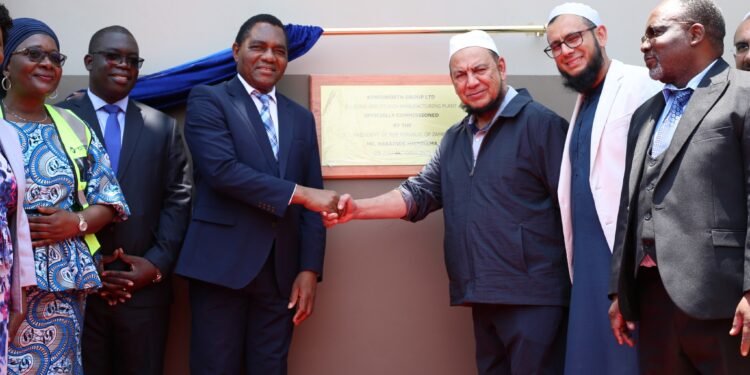HH commissions Trade Kings US$110 million plant
By George Zulu
PRESIDENT Hakainde Hichilema has officially commissioned a US$110 million Trade Kings group of Companies, Kingsworth Glucose and Starch plant, creating over 1,000 direct jobs.
Hichilema said the Kingsworth Glucose and Starch Company joins the Trade Kings Group, which has created over 17,000 direct jobs, beating any mine in the country.
He said this during the commissioning of the Glucose and Starch Plant worth US$110 million in Lusaka yesterday.
“This is bigger than any single miners’ employer. I always say to colleagues in Cabinet, you must put context to these things. I’m not aware of a single mine employing 17,000 workers,” he said.
Hichilema said the investment by Trade Kings in Zambia exceeded over US$1 billion in production, manufacturing, and value addition.
He urged the Trade Kings Group of companies to offer a favorable market to small scale farmers.
“A lot of this investment goes into production, into manufacture, into value addition. You can see that every dollar has led to a bit more jobs invested here. So, we want to indicate here that these are the investments we need. From the Zambian group, investing in Zambia, they are doing their job, we must do ours,” he said.
The President urged line ministries to resolve any outstanding issues that may compromise the rate of development the country needs.
Hichilema said such an investment would improve the quality of life and investment in the country.
Trade Kings Group of Companies Limited executive director corporate affairs, Phill Daka, said the US$110 million investment had been split into two phases.
Daka explained that US$60 million was pumped into Phase One of the project, while another US$50 million would go to Phase Two of the plant, which positions Zambia as the third producer of glucose and starch in Africa.
“This comes after Egypt, South Africa. Additionally, the plant that you are commissioning today will be responsible in this Phase 1 of 1,000 sustainable direct jobs. Today, this plant enhances industrial self-sufficiency,” he said.
Daka said over 126,000 tonnes of maize would be sourced locally, creating value across the maize supply chain, starch, glucose, maltodextrin and animal feed by-products.
“This will uplift rural livelihoods and strengthen Zambia’s agribusiness ecosystem. Social impact. The benefits are not only at KGL or at the group level. The benefits are at the national score. We are talking US$30 million of annual import savings. We are talking US$150 million of export potential,” he said.

























